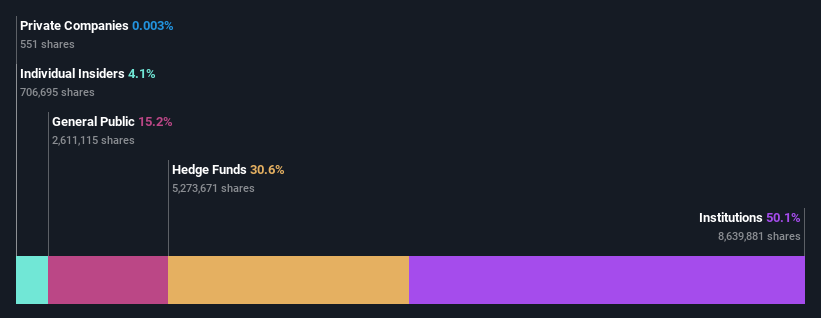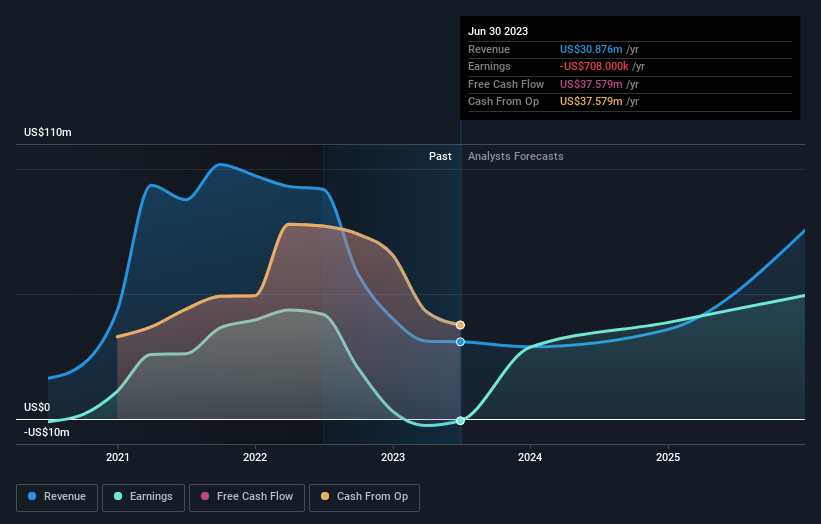- United States
- /
- Mortgage REITs
- /
- NYSE:NREF
A great week that adds to NexPoint Real Estate Finance, Inc.'s (NYSE:NREF) one-year returns, institutional investors who own 50% must be happy

Key Insights
- Significantly high institutional ownership implies NexPoint Real Estate Finance's stock price is sensitive to their trading actions
- A total of 3 investors have a majority stake in the company with 62% ownership
- Ownership research along with analyst forecasts data help provide a good understanding of opportunities in a stock
Every investor in NexPoint Real Estate Finance, Inc. (NYSE:NREF) should be aware of the most powerful shareholder groups. And the group that holds the biggest piece of the pie are institutions with 50% ownership. Put another way, the group faces the maximum upside potential (or downside risk).
And last week, institutional investors ended up benefitting the most after the company hit US$339m in market cap. The one-year return on investment is currently 8.5% and last week's gain would have been more than welcomed.
Let's delve deeper into each type of owner of NexPoint Real Estate Finance, beginning with the chart below.
Check out our latest analysis for NexPoint Real Estate Finance

What Does The Institutional Ownership Tell Us About NexPoint Real Estate Finance?
Institutions typically measure themselves against a benchmark when reporting to their own investors, so they often become more enthusiastic about a stock once it's included in a major index. We would expect most companies to have some institutions on the register, especially if they are growing.
We can see that NexPoint Real Estate Finance does have institutional investors; and they hold a good portion of the company's stock. This implies the analysts working for those institutions have looked at the stock and they like it. But just like anyone else, they could be wrong. It is not uncommon to see a big share price drop if two large institutional investors try to sell out of a stock at the same time. So it is worth checking the past earnings trajectory of NexPoint Real Estate Finance, (below). Of course, keep in mind that there are other factors to consider, too.

Investors should note that institutions actually own more than half the company, so they can collectively wield significant power. Our data indicates that hedge funds own 31% of NexPoint Real Estate Finance. That's interesting, because hedge funds can be quite active and activist. Many look for medium term catalysts that will drive the share price higher. Our data shows that Highland Capital Management, L.P. is the largest shareholder with 31% of shares outstanding. In comparison, the second and third largest shareholders hold about 19% and 12% of the stock. Additionally, the company's CEO James Dondero directly holds 1.7% of the total shares outstanding.
A more detailed study of the shareholder registry showed us that 3 of the top shareholders have a considerable amount of ownership in the company, via their 62% stake.
Researching institutional ownership is a good way to gauge and filter a stock's expected performance. The same can be achieved by studying analyst sentiments. Quite a few analysts cover the stock, so you could look into forecast growth quite easily.
Insider Ownership Of NexPoint Real Estate Finance
The definition of an insider can differ slightly between different countries, but members of the board of directors always count. Company management run the business, but the CEO will answer to the board, even if he or she is a member of it.
Most consider insider ownership a positive because it can indicate the board is well aligned with other shareholders. However, on some occasions too much power is concentrated within this group.
We can report that insiders do own shares in NexPoint Real Estate Finance, Inc.. As individuals, the insiders collectively own US$14m worth of the US$339m company. This shows at least some alignment. You can click here to see if those insiders have been buying or selling.
General Public Ownership
The general public-- including retail investors -- own 15% stake in the company, and hence can't easily be ignored. This size of ownership, while considerable, may not be enough to change company policy if the decision is not in sync with other large shareholders.
Next Steps:
While it is well worth considering the different groups that own a company, there are other factors that are even more important. Consider for instance, the ever-present spectre of investment risk. We've identified 2 warning signs with NexPoint Real Estate Finance , and understanding them should be part of your investment process.
If you are like me, you may want to think about whether this company will grow or shrink. Luckily, you can check this free report showing analyst forecasts for its future.
NB: Figures in this article are calculated using data from the last twelve months, which refer to the 12-month period ending on the last date of the month the financial statement is dated. This may not be consistent with full year annual report figures.
Valuation is complex, but we're here to simplify it.
Discover if NexPoint Real Estate Finance might be undervalued or overvalued with our detailed analysis, featuring fair value estimates, potential risks, dividends, insider trades, and its financial condition.
Access Free AnalysisHave feedback on this article? Concerned about the content? Get in touch with us directly. Alternatively, email editorial-team (at) simplywallst.com.
This article by Simply Wall St is general in nature. We provide commentary based on historical data and analyst forecasts only using an unbiased methodology and our articles are not intended to be financial advice. It does not constitute a recommendation to buy or sell any stock, and does not take account of your objectives, or your financial situation. We aim to bring you long-term focused analysis driven by fundamental data. Note that our analysis may not factor in the latest price-sensitive company announcements or qualitative material. Simply Wall St has no position in any stocks mentioned.
About NYSE:NREF
NexPoint Real Estate Finance
Operates as a commercial mortgage real estate investment trust in the United States.
Fair value with acceptable track record.
Similar Companies
Market Insights
Community Narratives



